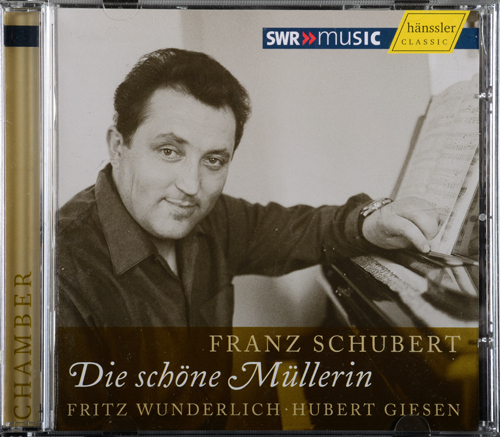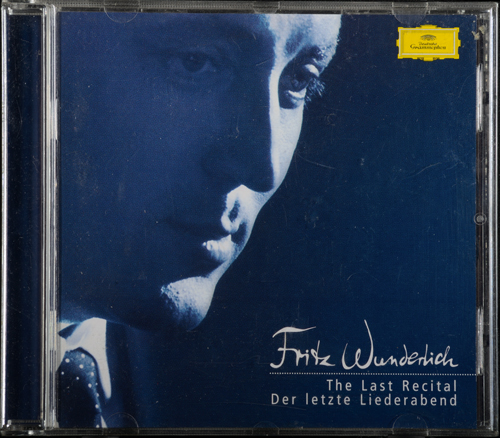
The 'new' Wunderlich recording from '64, which is actually his second

Almost ten years ago DGG published a remastered recording of Wunderlich's last concert.
Wunderlich's three fair maids

The 'new' Wunderlich recording from '64, which is actually his second

Almost ten years ago DGG published a remastered recording of Wunderlich's last concert.
Fritz Wunderlich’s Schöne Mülerin has often been regarded as one of the most beautiful recordings of this Schubert-cycle. When people talk about Wunderlichs Müllerin, they refer to the DGG-recording from 1966 – even if they are not aware of this. What most people don’t know, is that there (at least) three different recordings, from ’58, ’64, and ’66 respectively.
Of course, there are many other recordings of this intriguing song cycle, which tells the story of a young lad who falls in love with a miller maid but proves to be too romantic to win her heart. I personally have over thirty of them, most of them by tenors, just like Wunderlich was. An important reason why Wunderlich’s recording is so often mentioned, is its vocal perfection. Then of course there is the special timbre of Wunderlich’s voice, that almost all people see as very pleasant, many even as very beautiful and moving. Now this may be quite subjective, whereas the technical perfection of his singing is much less so. You can’t hear one single note on the last recording where the singer has a difficulty, it sounds like effortless singing; like there is no such thing like a passagio. The voice is remarkably even from bottom to top. Of course in reality it was not really effortless, but it’s clear that Wunderlich didn’t have many vocal difficulties. He also recorded the Müllerin in 1966 in just three days, which was kind of unheard. Wunderlich was proud of this feat.
He wasn’t proud of his first recording of die Müllerin though, the one from 1957 with Karl Stolze. He made it because he had to, the obligation came forth from his contract with the ‘Deutscher Phono Club’. In 1963 then he was very happy to be able to made a second recording, now with this accompanist and Lieder-tutor Hubert Giesen and it’s this recording that’s now available as a cd from Hänssler Classic (the recording actually is from the radio station SWR Music).
So now there are three: the first, which is neither vocally nor interpretation wise perfect, the second, which we are going to discuss in a few moments and the third, which is regarded as vocally perfect and interpretation wise, well, we’ll discuss that also on in a few moments.
Alan Blyth says in Gramophone in 1989 of the last recording he admires ‘ the sheer warmth and ease of singing while being disappointed with the interpretation.’ He adds to that that Wunderlich does very well in songs like Ungeduld but less so in most others, especially in slower songs and complains about Giesen and calls the latter ‘unimaginative’. Is Blyth right? Partly, yes, I’m afraid. Even when he recorded his last schöne Müllerin, Wunderlich was still not yet completely ready to sing Lieder. In 1957 he even didn’t know how to sing Lieder at all. Tragically enough, he learned it just before he died. The recording from a radio transmission of a concert with the Dichterliebe in Edinborough a few days before his death shows this very well.
Alas, we don’t have a Müllerin where Wunderlich sings like on his last concert. Maybe he thought you couldn’t sing Schubert so emotionally, maybe DGG or Giesen talked him out of it, who knows. When he was very young he tended to sing ‘schmalzig’, a little kitchy, so probably he stayed mostly on the safe side with his interpretations from then on. We see that often with younger singers, in the old Dichterliebe-recording of Quasthoff we have difficulties to recognise the later Quasthoff who sang so personally and the same can be said – mutatis mutandis – of Gerhaher’s first cd. Now this not so say that Wunderlich did everything wrong, there several songs he does better in a way than others, even if such a judgement this highly subjective. But we can be sure Wunderlich would have changed his interpretation had he lived longer. To see that you just have to compare his DGG-recording of Dichterliebe and the one of his last concert. To get an idea of how Wunderlich could have interpreted the Müllerin later, we could listen to some songs of other tenors, like Schreier, Prégardien or Bostridge. Of course they just give us hints, because no two voices are alike.
It’s the voice, that makes it a pleasure to listen to (especially the last two) recordings, even though the interpretation may not be perfect. Maybe we should add to that that Wunderlich applies sometimes a small amount of rubato, so there is more interpretation than we hear of we don’t listen carefully. On the other hand there are - especially in the second and first recordings – so many places where Wunderlich sings repeated texts without any variation, be it in diction, volume or tone, that a listener who knows recordings from especially Fischer-Dieskau might ask himself what is going on here.
Maybe we should excuse Wunderlich, because he was always in a hurry. In his short life he gave an unbelievable amount of concerts and made more recordings than many others did in a time period four or more times longer. (Many of the recordings Wunderlich made under a different name, to escape from his contracts.) He simply didn’t have the time to prepare an interpretation like Fischer-Dieskau, who sometimes took a complete day to work on one single phrase. In that same day Wunderlich recorded one half of the Müllerin we’re talking about now.
What is so nice of those three recordings, is that they give a very good idea how Wunderlich came to his vocal perfection. Wunderlich was famous for his vocal openness, but on his first recording (1958) the voice is not yet completely open. On the second the openness is already almost completely there, but here you can hear that in fast songs some legato is lacking. From the third recording you can’t say that anymore, although some songs could be faster. (You can compare the timings of the three recordings below.)
This is not to say that the second recording is vocally flawed, it’s just not yet completely perfect. When it comes to interpretation, the two last recording complete each other quite well. Some tempi on the second recording are simply strange though. ‘Wohin’ for example, is much too fast, to that extend that all mystery is lost.* Some other songs though are actually better than on the last recording.
By comparing the last two recordings, it’s easy to make a fourth Wunderlich DsM, which i.m.o. would be the best. For this reason you just take the last recording and exchange 1 (Das Wandern), 7 (Ungeduld), 14 (Der Jäger) and 15 (Ungeduld und Stolz) by the tracks from the second recording and maybe even 18 (Trockne Blumen) and 19 (Der Müller und der Bach) from the very first one, at least the tempo of it.
Now fifty years after they have been recorded, more and more unknown Wunderlich-recordings are surfacing, mostly because the rights of the recordings are expiring. We won’t get Wunderlich back from death this way, but at least his musical testament is growing.
* Axel Schiotz with Moore on the piano does it as fast as Wunderlich, but somehow it doesn’t sound as fast.
Timings for the three recordings:
_______‘66____‘64____‘57______
1 3’08 1’53 2’54
2 2’29 2’09 2’10
3 1’37 1’34 1’36
4 2’08 1’56 1’43
5 2’39 2’29 2’38
6 3’46 3’48 3’48
7 3’09 2’14 3’03
8 4’08 3’04 4’11
9 3’47 2’26 4’11
10 4’21 3’03 4,34
11 2’47 2’34 2’31
12 4’12 4’07 4’10
13 2’36 2’25 2’15
14 1’15 1’07 1’18
15 1’48 1’34 1’44
16 3’57 4’13 4’05
17 2’20 2’08 2’13
18 3’16 3’19 3’49
19 3’46 3’54 4’15
20 7’12 4’15 7’27